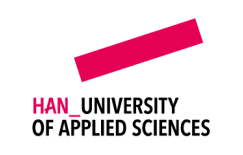For more information:
Karin Lagendijk
karin.lagendijk@han.nl
Subscribe? Good to know!
- For minors starting in September, after the registration period in March, a draw takes place in April if there are at that time more subscribers than available places.
- For minors starting in February, after the registration period in October, a draw takes place in November if there are at that time more subscribers than available places.
For the minors with places still available applies until the closing of the subscription period: Once a minor is full, it is closed!
In addition, if the number of subscribers after four weeks is below the norm; this minor may possibly be withdrawn. So if you are interested, sign up immediately!
Subscribe in time!
Note: For HAN students it means that, in case of cancellation of the first choice AFTER the period of decision (this takes a full month) they may re-subscribe for the still available minors.
Even then: Once a minor is full, it is closed!
A good overview of the HAN minors can be found in the minors app! The app is accessible via: http://www.minoren-han.nl/
Do you want to learn more about organic synthesis, polymerizations and biomedical and/or physical behavior of polymers. In this minor these topics are combined in 14 full days of experimenting combined with work discussions during tutor meetings (9 + 3 hours a week).
Practical and tutor group meetings
Within this minor you will work on a project that starts with the synthesis of a monomer or initiator. You learn to fully characterize your product by e.g. NMR or MS and assess the purity. Thereafter you will polymerize your monomer/initiator via a controlled polymerization techniques like RAFT, ATRP or anionic polymerization. The product is again fully characterized by e.g. SEC or DSC.
All polymers that are being synthesized obtain a unique physical feature relevant to biomedical applications. Some exhibit LCST behavior, others will form nanoparticles for drug delivery and some are able to bind DNA for cell transfections. Finally you need to show these characteristics e.g. by DLS, electron microscopy (SEM) or gel electrophorese measurements.
All the above mentioned techniques, except NMR, are available in our labs and will be operated by our students themselves.
The projects are discussed extensively during tutor hours on the basis of the accompanying articles and work discussions. The tutor hours are supplemented with workshops and presentations that all refer to searching for literature, understanding it and presenting.
Theory lessons
During this minor 7 hours of theory a week are scheduled during which the theory of organic chemistry, organic/retro synthesis, optimization, organic chemistry of polymers and physical chemistry of polymers will the addressed.
In this minor you will learn to perform scientific research based project that involves multiple steps disciplines. The projects are only loosely defines thus students:
o Learn to search literature
o Learn to master new topics themselves (and present it to others)
o Learn to systematically plan and perform experiments
o Learn to couple results and write a scientific report.
- Deepen theoretical knowledge in organic chemistry, polymer chemistry and polymer physics.
- Work on the following competences: Design, Experimentation, Analysis, Reporting and presentation, Project-based work / project management
Entry requirements
·Foundation year must have been
completed and the course units CNSYNT,
CNSYNC, CNORAT, CNORAC, CNBBPT
and CNBBPC (in Dutch) or CESYNT,
CESYNC, CEORAT, CEORAC, CEBBPT
and CEBBPC (in English) have at least
been taken. PRCHAA01 and PRCHBB01
(in Dutch) or PRACHS01 and PRCHTA01
(in English) must be satisfactory
Whenever a student did not finish parts of
year 2 a personalized schedule will be
made to ensure certain parts from this
course unit in addition to the parts from
the previous course unit will be done.
Participation in ORGPOL01 is dependent
on the motivation and study load of the
student.
General pre-requisites
· The student should master theory on: ester and amide formation, hydrolysis reactions, organic reduction and oxidation reactions, aromatic substitution reactions, Sn1/E1 and Sn2/E2 reactions, addition to carbonyls, Grignard reactions
· The student should master theory on: free radical polymerization, anionic and cationic polymerization, theory on SEC/DSC and rheology.
· External students will be interviewed before enrolment.
This minor is offered in English, however all exams are offered in Dutch and English. Although we encourage an international mindset we allow all Dutch speaking project groups upon request. During theory, tutor hours and general instructions the spoken language will be English.
- Knowledge tests
- Thematic tests
- Literature report
- Research report
- Practical
Semesters start on 1 February and 1 September; classes start on the Monday of that week.
Students are expected to be available Monday to Friday, 09.00 - 17.45 during the first semester. Each week one day of practical work (9 hours), 3 hours of tutor meetings and 7 hours of theory lessons will be scheduled.
Studenten van de HAN kunnen zich eenvoudig aanmelden via OSIRIS.
Mocht het inloggen in OSIRIS niet lukken via bovenstaande link ga dan naar de site van OSIRIS.
Externe studenten kunnen zich eenvoudig aanmelden via Kies Op Maat.




